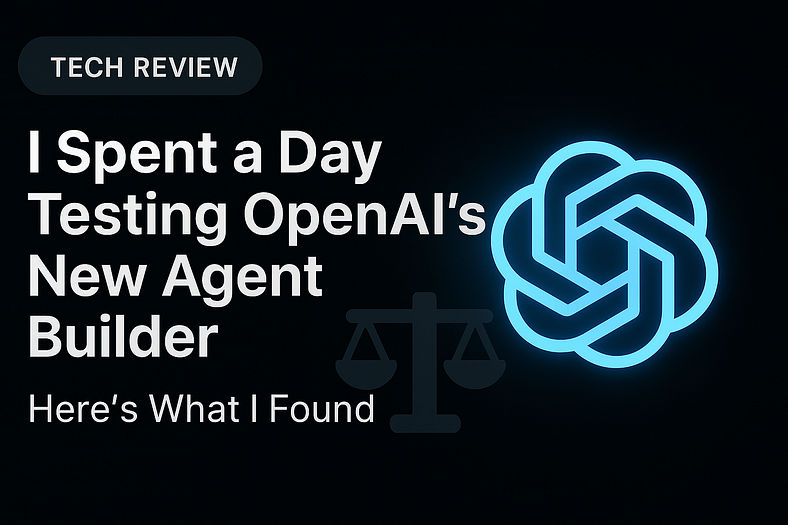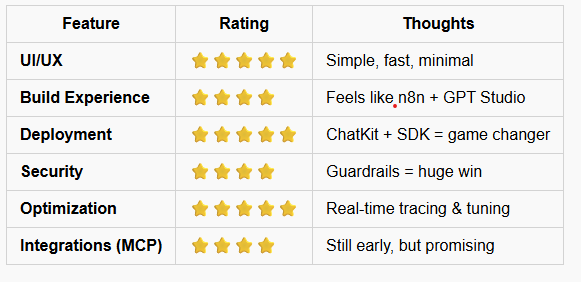🧠 I Spent a Day Testing OpenAI’s New Agent Builder — Here’s What Happened

Something big just dropped.
OpenAI quietly released Agent Builder, and after spending years inside automation tools like n8n, Make, and Zapier, I couldn’t wait to see if OpenAI just made them obsolete.
So, I cleared my schedule, fired up my laptop, and spent an entire day testing it. Here’s exactly what happened — the good, the bad, and why this might just change everything about how we build AI agents.
🚀 First Impressions — This Isn’t Just Another Automation Tool
The first thing I noticed? Agent Builder isn’t trying to replace n8n or Zapier — it’s trying to upgrade the entire idea.
Everything happens inside platform.openai.com, where OpenAI has built something called the Agent Kit — a complete toolkit for building, deploying, and optimizing AI agents.
Think of it as three pillars:
Build your agent visually
Deploy it anywhere (via ChatKit or SDKs)
Optimize it with evaluation and performance tracking
The layout is clean — an open canvas where you drag and drop nodes, connect logic, and give your agent brains with GPT-4 or GPT-5. It’s simple, beautiful, and fast.
🧩 Building My First Agent
I decided to build something practical — a YouTube Q&A Agent that could answer questions about my videos using their transcripts.
Inside the Agent Builder, I added:
I uploaded transcripts from 5 of my latest YouTube videos. OpenAI automatically vectorized them — no extra setup, no Pinecone, no embedding scripts.
Then I gave my agent instructions:
“You are an assistant that helps users find answers from my YouTube videos. Always respond with information from the transcript and cite the source.”
I clicked Preview, asked:
“What are the four stages of AI automation you mentioned?”
And it answered — perfectly. It even referenced the correct video.
That’s when I realized: OpenAI just built a native RAG engine inside their platform.
🧱 Guardrails, Security, and Professional Deployment
Security used to be an afterthought in agent builders. Not here.
OpenAI added Guardrails — a visual node that filters sensitive info before it even hits the model. You can block PII, prevent jailbreaks, and enforce safety rules.
This makes the platform enterprise-ready out of the box.
And once you’re ready to deploy? You have two options:
ChatKit — to embed your agent as a chat widget on any website
Agent SDK — to fully customize and integrate it into your own apps
This is where OpenAI crushes competitors. No more exporting webhooks or juggling APIs. Your agent lives inside OpenAI’s infrastructure — fully optimized, monitored, and safe.
⚙️ The Secret Weapon: MCP Integration
Here’s something power users will love — MCP Servers.
They’re OpenAI’s new way to connect to external tools like Gmail, Stripe, Plaid, or HubSpot. It’s like Zapier’s “actions,” but native to OpenAI.
So, your agent can:
That’s a massive shift — it means your AI agents can actually take actions, not just chat.
🧠 Optimization & Tracing
Most no-code tools stop once your workflow runs. OpenAI goes further.
They’ve built Agent Optimization — complete with trace grading, dataset evaluations, and performance tuning. This means you can train your agents to improve over time using real user data.
It’s the difference between a static chatbot and a self-improving business agent.
⚖️ My Verdict After One Day
After a full day of testing, here’s how I’d summarize it:

💡 Final Thoughts
Agent Builder isn’t just another automation tool — it’s OpenAI’s play for the entire agent ecosystem.
While n8n and Make still win on flexibility, OpenAI wins on simplicity, security, and direct model access.
If you’re a developer, automation builder, or AI consultant, this platform is worth keeping an eye on.
Because for the first time, we can build, deploy, and optimize AI agents — all inside OpenAI.
And that’s a big deal.
🔗 Join the AI Automation Community
💬 Free Skool community: https://www.skool.com/ai-university-4881/about?ref=a5e04c95f0fc4a20a985370a705cbef5
🚀 Paid Skool community: https://www.skool.com/yar-ai-automation-school-9911